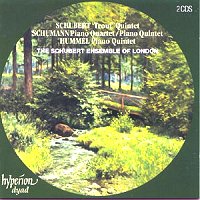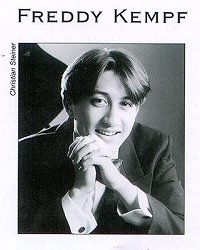A hectic tour of London's leading chamber music venues on 7th January confirmed a healthy scene in the Capital at the beginning of the 2001 season.

Blackheath Sundays 2001 drew a practically full house to its first
Sunday morning concert of the season - gratifying for so adventurous a programme.
The Medici Quartet began their three concerts, sensibly spaced out
between now and May, with a workmanlike account of Bartok No.2. Of particular
interest is that in they have scheduled three late examples of Elisabeth
Lutyens' thirteen string quartets, Op.125 (Doubles), 146 &
155.
Paul Robertson, talking (with some circumspect) about Liz Lutyens, with whom the quartet had worked on these works, told us that for many years she lived just round the corner in Blackheath Village. He explained that she made each of these pieces around 11½ mins. long deliberately, 'to break the barrier into the BBC's next fees bracket'! She felt that she was never quite the right age for easy acceptance - when a young woman composer, only the old (men) were revered; when she became old it was the reverse.
The Op 125 quartet, subtitled Rounds, was spare in texture, as was her way, and heard again now, very attractive and attention-holding. Clearly Webern-influenced, she passed the fragmentary phrases around the instruments, and extended the normal palate by tapping on the strings with the bow, and onto the bodies of the instruments with knuckles. I look forward to refreshing my memory of this unique and completely individual composer, who never achieved popular fame, but was always respected, as much for her flamboyant personality (she loved to shock, said Robertson) as for her rigorous music. Her entertaining autobiography A Goldfish Bowl (London, 1972) tells how she made her way by composing a lot of film music whilst bringing up a family. Her use of 12-note technique seems to have been considered almost morally reprehensible by some in England in the 1950s, but in the more sympathetic climate of the following decade Lutyens achieved a greater measure of recognition. She felt that she was never quite the right age for easy acceptance - when a young composer (and a woman!), only the old were revered; when she became old it was the reverse. See David Wright's profile
The South Place concerts, promoted by the London Chamber Music Society, have notched up their concert No. 2867in this, the 110th season of this record series! Admission is a paltry £5, free for children and students 8-22 and many long-term regulars take up the Season Tickets available. It was a magnificent opening concert for the year, wholly satisfying for the coming together of all the important elements. Listening to music in three of London's most admired halls on the same day confirmed our belief that the acoustics of Conway Hall (upstairs) are unbeatable.
The Schubert Ensemble of London is one of the finest groups to be heard regularly on the chamber music circuit and the present line up is as good as they've ever been. William Howard is one of my favourite pianists (less often heard solo, but a Schubert piano sonata in A minor from him sticks in my memory) and balancing piano (a lovely Bosendorfer here) with strings has become second nature to this group. No one overdoes their solo spot, and it is team interaction which sets the style and gives continual satisfaction.

Hummel's Eb quintet is more compact than many of his works which have
understandably fallen into disfavour (he was eclipsed By Beethoven) and his
pioneering combination of four different strings prompted Schubert to compose
the Trout Quintet, a jewel in this group's crown. (Both can be collected
in a bargain Hyperion dyad with Schumann
CDD22008.) Dvorak's quartet, also
in Eb, is in his happiest vein and, looking around during the performance,
smiles were visible on the faces of the Conway Hall's regular
patrons.
Edward Rushton's name is new to me. His ingenious L'An Mil was one of the many commissions by The Schubert Ensemble of London is genuine programme music of a type which is rare nowadays (contemporary music and its programme notes often seem to bear little relationship to each other). It is inspired by a monk who recorded a dream of a series of dreadful disasters in 999, but awoke to find that it had all been in his mind and that it was a beautiful morning with the world still as it should be! There is real originality in the uncluttered scoring, with bell sounds - the piano often one-handed, at other times in unison two high octaves apart - suggestions of plainsong and Machaut in the modal melodies and conjunct harmony, none of these allusions too literal. Each instrument is given its opportunity to further the argument. After the graphic disaster-music, the daybreak is as heart-warming as Ravel's in Daphnis & Chloe. A composer to seek out; b. 1972, apparently living now in Switzerland. (see appended footnote)

We attended Freddy Kempf's afternoon Wigmore Hall piano recital
with great expectations, and it was predictably packed to standing for this
prodigy and youngest BBC Young Musician, 'now established as one of the most
sought-after pianists in the world'. (I had enjoyed his
Rachmaninoff
CD on BIS and was interested to hear him live in a demanding,
romantic virtuoso programme.) Pianists are sometimes categorised as being
Liszt players or Chopin players and the two are not that often juxtaposed
as here. Kempf gave a thoughtful and texturally varied performances of the
two major Chopin items, with great sensitivity at times and easy command
of their decorative idiom. But there was a tendency to 'bring out' inner
parts for the sake of it, something different. He was inclined to occasional
over-loud climaxes (e.g. to finish the Ballade), out of scale for
the structure of the music and too for the intimate venue - as if he had
been playing too much Liszt, where flamboyant technical mastery of
prestidigitation and power tends to rule the day.
Indeed he had, I concluded! He got through the whole of the Transcendental Studies (1851) creditably in these simplified (!) versions of the Grandes Etudes of 1839, as draining (for this listener) to hear in extenso as they must be tiring to play; undeniably a great feat of memory and concentration, and one for the CV. I enjoyed Feux-follets but found myself so out of sympathy with most of this music that I have nothing more to add. See Marc Bridle's Interview with Freddy Kempf
Footnote
Edward Rushton (born 1972)
Edward Rushton studied at King's College, Cambridge and the Royal Scottish Academy of Music and Drama. His teachers included Robin Holloway and James MacMillan. He is now based in Zurich as a freelance composer and pianist, currently holding the post of Composer in Residence there at the Zentralbibliothek.
L’an mil
Programme Note
It is the night of 31 December, 999. Rudolf Glaber sits alone in his cell chronicling the portents and catastrophes that herald the millenium: 1000 years after the birth of Christ, when, according to the prophesies of St John the Apostle, the Antichrist will be let loose to spread destruction over the face of all mankind and the world will end. He reports comets, an ominous whale, natural disasters, epidemics, wars, famines and cannibalism, while the stormy night rages outside, battering on the doors of the monastery. He writes on, and suddenly it is morning. The sun rises, the birds sing. The world has not ended. Christendom breathes a sigh of relief.
"It was as if the whole world were shaking itself free, shrugging of the burden of the past, and cladding itself everywhere in a white mantle of churches."
Peter Grahame Woolf
 Return to:
Return to: